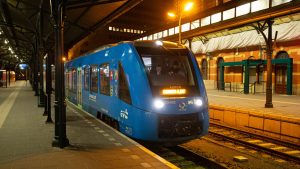 According to a report released by the Province of Groningen regarding the Coradia iLint tests in the Netherlands, the train successfully met 4 objectives of the test frame. They included the authorisation by the Dutch National Safety Assessor to run on the railway network, fully zero emission and perfectly fitting the commercial service of the current timetable, quick and easy refuelling, and familiarisation of the general public to hydrogen mobility.
According to a report released by the Province of Groningen regarding the Coradia iLint tests in the Netherlands, the train successfully met 4 objectives of the test frame. They included the authorisation by the Dutch National Safety Assessor to run on the railway network, fully zero emission and perfectly fitting the commercial service of the current timetable, quick and easy refuelling, and familiarisation of the general public to hydrogen mobility.
The report says that the goals have all been achieved and that the hydrogen train is a fully viable alternative to diesel equipment.
Regarding the commercial service performance, both the stop timetable and the express timetable have been tested successfully. Hydrogen consumption, infrastructure compatibility, acceleration, braking, docking, maximal speed, performance of the auxiliaries, all operations went without problems.
The Dutch drivers found the behaviour of the train comfortable, smooth and easy to drive. Refuelling with green hydrogen went faster than expected and was performed safely.
Moreover, this zero-emission train is significantly quieter than the current diesel trains. This was confirmed during the tests and is a significant benefit for the passengers and inhabitants on the line.
“After Germany, the Netherlands is the second country in Europe where the Alstom’s hydrogen train has proven itself a unique emissions-free solution for non-electrified lines,” Bernard Belvaux, Managing Director, Alstom Benelux said.
The Alstom’s hydrogen train has been extensively tested with the Province of Groningen operator Arriva, the Dutch railway infrastructure manager ProRail and the energy company Engie. DEKRA, an independent testing inspection and certification company, was the test leader. The tests took place without passengers.
Coradia iLint tests were carried out in March on the 65 km railway line between Groningen and Leeuwarden in the north of the Netherlands. The tests aimed to investigate whether a hydrogen fuel cell train could be a fully sustainable alternative to the diesel trains currently running in the northern part of the country.
Share on:



